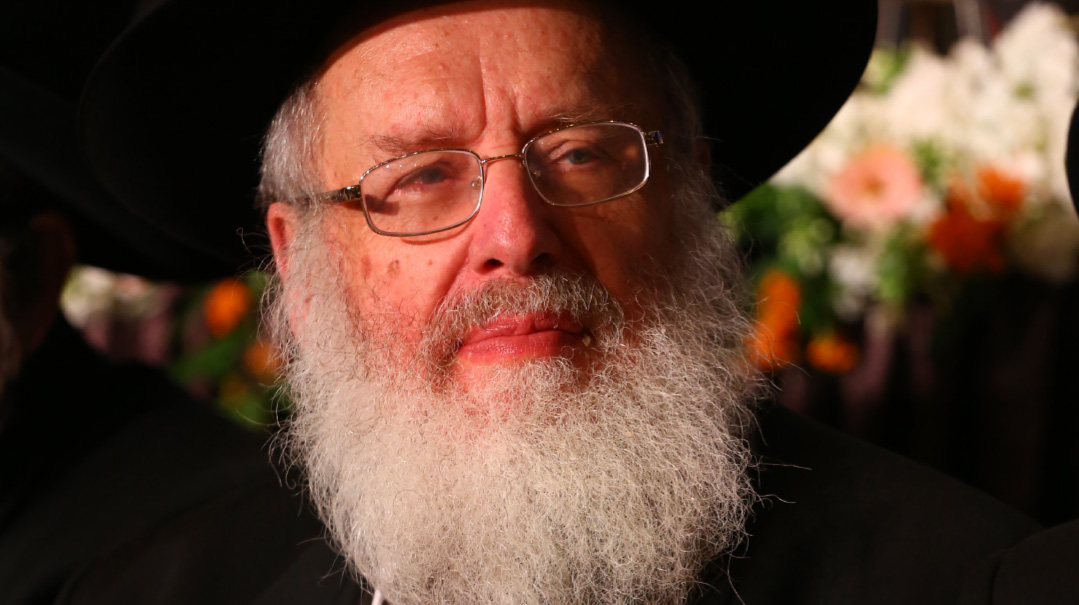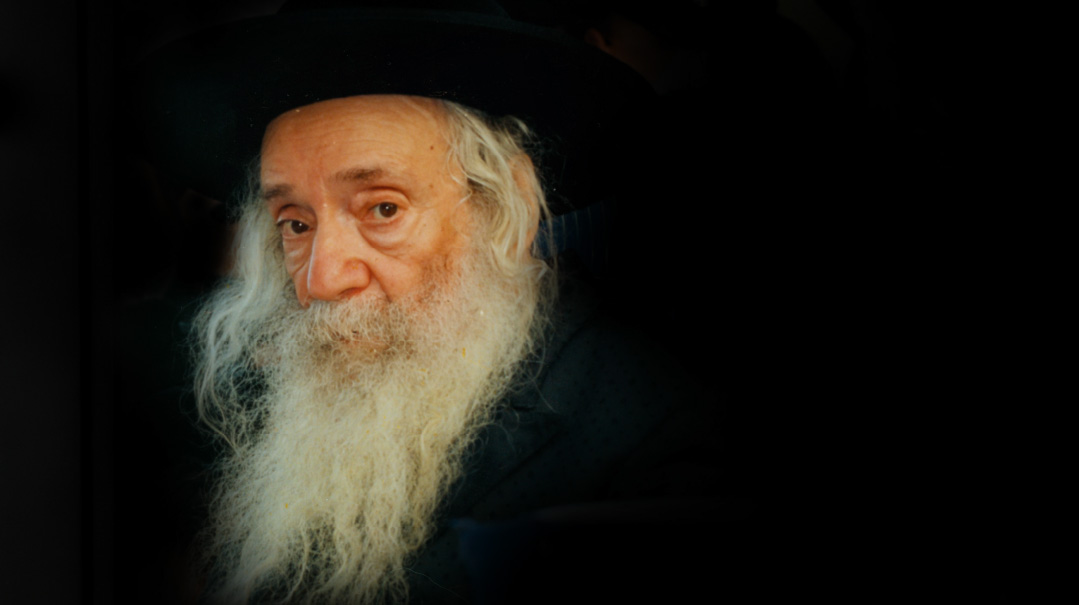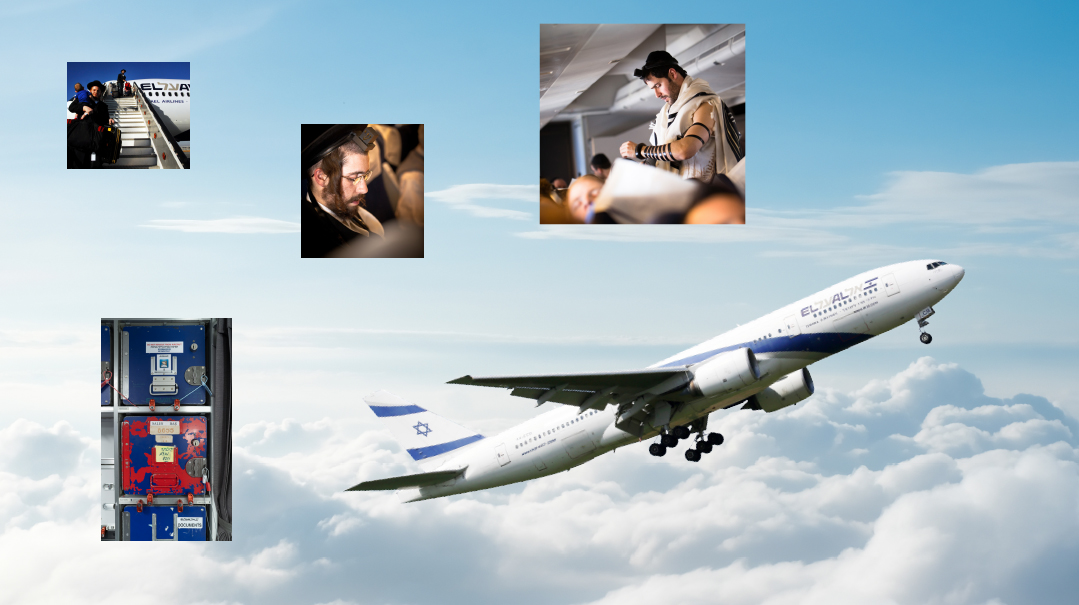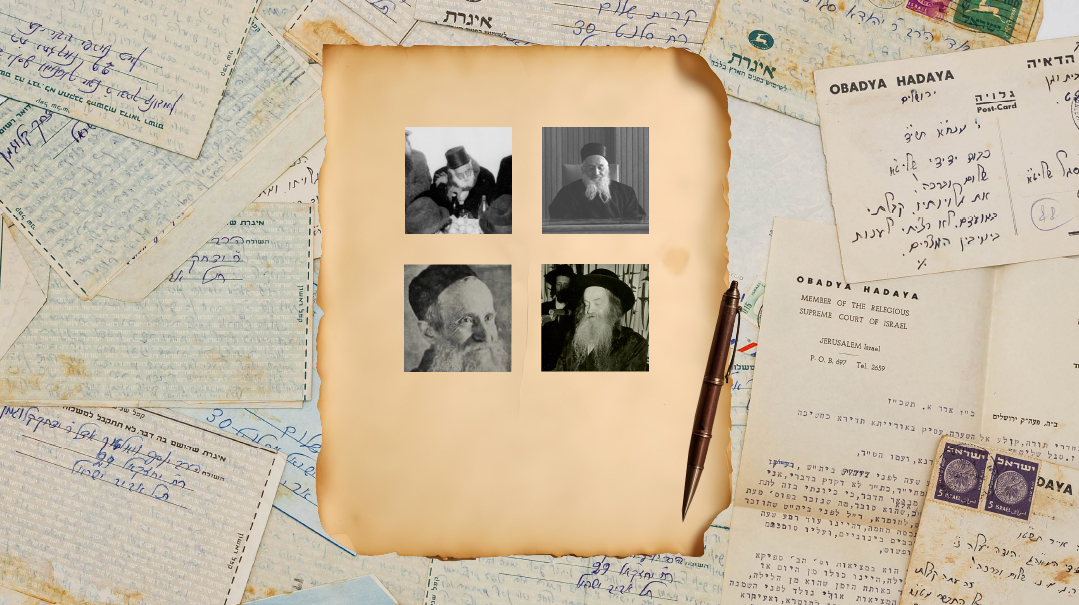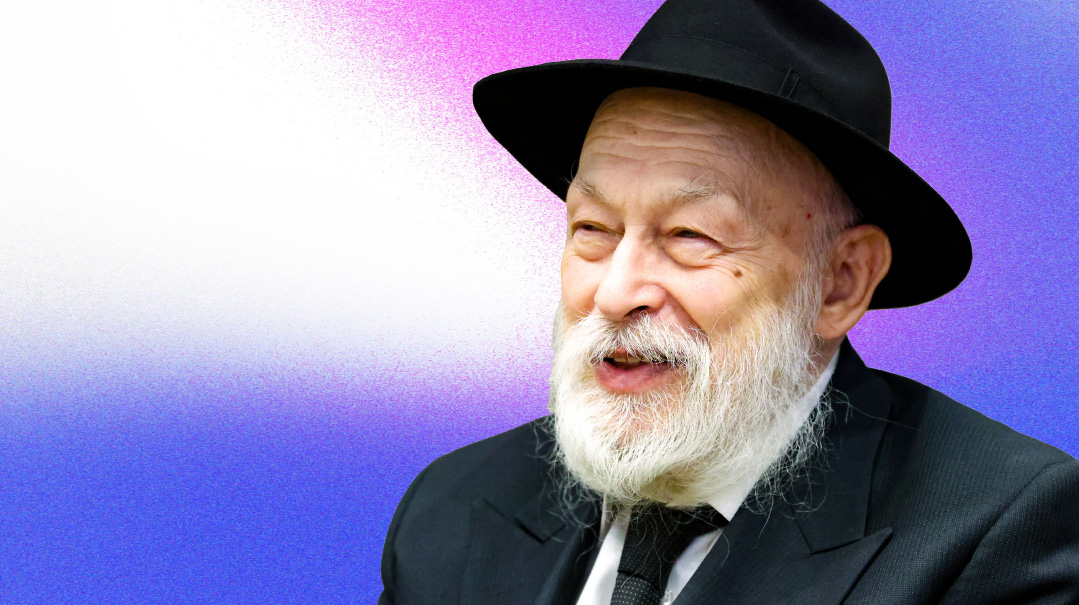Spirit & Substance
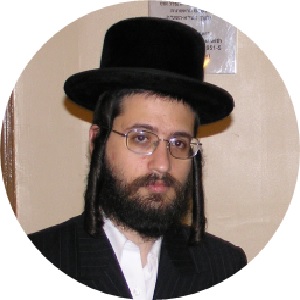
Whatever the venue, Rabbi Avraham Mordechai Malach uses wit and humor as a medium but never loses sight of the message
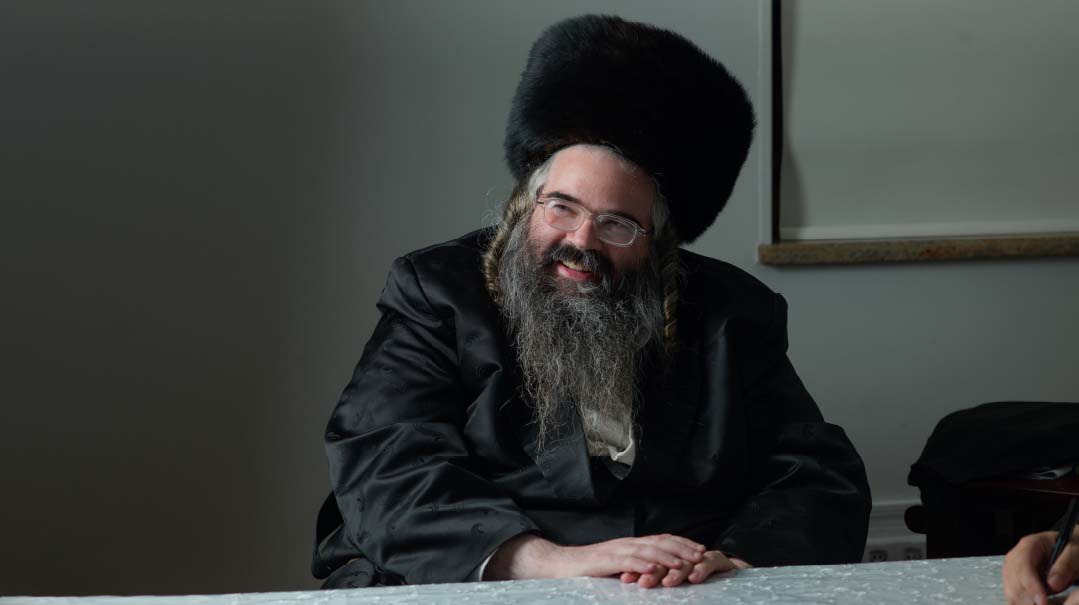
Photos: Naftoli Goldgrab
While Motzaei Shabbos in Brooklyn usually features heavy foot traffic, on this particular weekend, with a hurricane battering New York, people were shuttered in their homes. I get out of my Uber, my kapoteh dripping wet and the edges of my shtreimel blowing wildly in the wind, and gratefully step into the warm, and more importantly, dry Malach home.
I’m excited to finally meet the man behind the most popular soundtrack in tens of thousands of frum homes. People listen to Rav Avraham Mordechai Malach’s shiurim in doctors’ waiting rooms and in hospitals, on the way to work and while waiting for the train. His speeches are broadcast on an endless loop at chinuch conventions. And it’s the no-fail conversation starter: “Nu, have you heard Malach’s latest vort?”
His vertlach are always engaging, his rich language laced with humor. He’s been gifted with stand-up comedian talents, but he uses them only as a medium for the messages he conveys to his audiences, about chinuch, avodas Hashem, our role in This World, emunah and bitachon, and the Jewish way to deal with challenges. He’s not afraid to touch on sensitive subjects. He’s a maggid shiur in Yeshivas Meor HaTorah, one of the most sought-after speakers in Jewish world, and an entertaining badchan at weddings. He’s the man who, almost literally, seems to dance at all weddings.
The setting in the Malach home is familiar; it’s a typical Motzaei Shabbos scene. The Havdalah candle is still on the table, as is the Shabbos tablecloth. The lights are all on. Children are underfoot and the rich scent of cholent lingers in the air. My host is wearing a pair of woolen tzitzis and his peyos sway from side to side, and we sit down for what turns out to be a fascinating conversation.
Reb Avraham Mordechai was born a bit more than 40 years ago. His father, Reb Pinchas Menachem Malach a”h, passed away a number of years ago, but hearing Reb Avraham Mordechai speak about his father, it’s clear he was a strong influence. Reb Pinchas Menachem was born in the small town of Ostrolenka to a family of Gerrer chassidim, and his father, Reb Chaim Wolf, was a chassid of the Sfas Emes. While Reb Pinchas Menachem himself was drawn to the influence of the Novardok mussar movement, he never forgot his Gerrer roots.
Anyone who hears Reb Avraham Mordechai’s shiurim has surely heard numerous stories of his father’s mesirus nefesh for Yiddishkeit in the forests of Siberia.
“He once told me an interesting story,” Reb Avraham Mordechai shares. “My father was in Siberia with another bochur who came from a Gerrer family. They were digging in the ground, and suddenly, they found a full bottle of vodka.
“ ‘It must be a sign from Above!’ the friend said.
“So they sat down and figured out it was 5 Shevat, the yahrtzeit of the Sfas Emes. It was very moving for two bochurim whose parents had traveled to the tzaddik.”
After the war, Reb Pinchas Menachem settled in Israel, where he married and had seven children. But then his wife fell ill, and passed away, and he was left a widower with young children. Rav Yaakov Galinsky ztz”l, who was a close friend from Novardok, suggested a shidduch with the cook of the yeshivah, a righteous, G-d-fearing woman originally from Libya.
“My father had seven children. On the other hand, the proposed woman had no children and she wanted to have a family. So she went to the Beis Yisrael of Gur and shared her concerns. The Rebbe reassured her and promised, ‘You will yet have children.’ ”
The Rebbe’s promise materialized, and she had two sons. Reb Avraham Mordechai is one of them. To this day, the Malach family maintains close ties with the Libyan side of their family.
“If you had been here on Shabbos and seen the huge number of dips and salads, you would have easily figured out where we come from,” Reb Avraham Mordechai laughs.
His wife comes from illustrious stock as well. “My father-in-law, Reb Yisrael Moshe Baum a”h, was a very special Yid,” he says warmly.
Sadly, he passed away from Covid. Reb Avraham Mordechai shares an interesting story about his father-in-law.
“He fulfilled the words of Chazal, ‘v’yiheyu aniyim bnei beisecha,’ that one should bring paupers into his home. His Shabbos and Yom Tov meals were spent in the company of all kinds of people, many of whom faced rejection elsewhere. When he came to eat in our home, up to the last Purim of his life, all his special guests came along with him. And when he once went to the Catskills for Pesach, he rented accommodations for them as well.
“Why am I telling you this?” he explains. “To give you some context for the second, fascinating part of the story. It was at his levayah. We opened the door to the chevra kaddisha vehicle and we see another aron there.
“ ‘Whose is this?’ we asked the chevra kaddisha in surprise.
“‘Oh,’ they said apologetically, ‘it’s a Yid who passed away from corona. A real meis mitzvah. He has no family or friends. Do you mind if he is part of the levayah?’
“We, who knew our niftar, were sure that this is exactly what he would have wanted, that he should have guests on his final journey as well…”
I ask Reb Avraham Mordechai how his speaking career began.
He smiles. “People ask me, ‘Avrum Modche, since when are you speaking?’ I tell them, I’ve been speaking since I was born, but one day, people just started listening to me…”
The beginning was modest. “I was a maggid shiur. During the day I taught young bochurim in yeshivah, and in the evenings, I entertained people at weddings. When people ask me when I started speaking for adults, I tell them they’re the same children I taught when they were young, it’s just that they grew up in the meantime…
“There was an organization called Tiferes Avos that organized chinuch lectures, and the directors asked me to come and give a lecture. It was my first speech on the subject of chinuch, and I was super nervous. I spent a whole week preparing.
“It was snowing heavily the night of the lecture. I came and saw a sign: ‘Tiferes Avos, downstairs.’ I was surprised; I knew the place, but didn’t know it had a basement. So I went down, and there was my audience sitting in a coatroom, which had been converted into an improvised conference room. There were three people sitting there, including the photographer.
“I was really disappointed,” he remembers. “I didn’t know what to do.”
But that ignominious lecture would prove to be the catalyst to his future as a speaker. One of the three people in the audience was Rabbi Mechel Shapiro, who later founded the Keiravtuni organization, an organization dedicated to bringing Jews closer to Hashem, their families and communities. Rabbi Shapiro brought Rabbi Malach on board as a speaker at Keiravtuni’s two annual weekends, and his reputation grew quickly.
Reb Avraham Mordechai Malach is the undisputed star speaker at those weekends. For his part, he saves his best stories for these lectures. “I’m like Shammai Hazakein who found a select animal each day and said, ‘This is for Shabbos,’ ” he jokes. “Every good idea that I come across, I save for the Keiravtuni Shabbos, unless I get better ‘merchandise’ of course.”
That first basement lecture, unimpressive turnout notwithstanding, gave Reb Avraham Mordechai a great story for his repertoire, but more importantly, he adds, “I’ve also learned that you mustn’t make light of any word at any event. You never know where it will get to and who it will influence.”
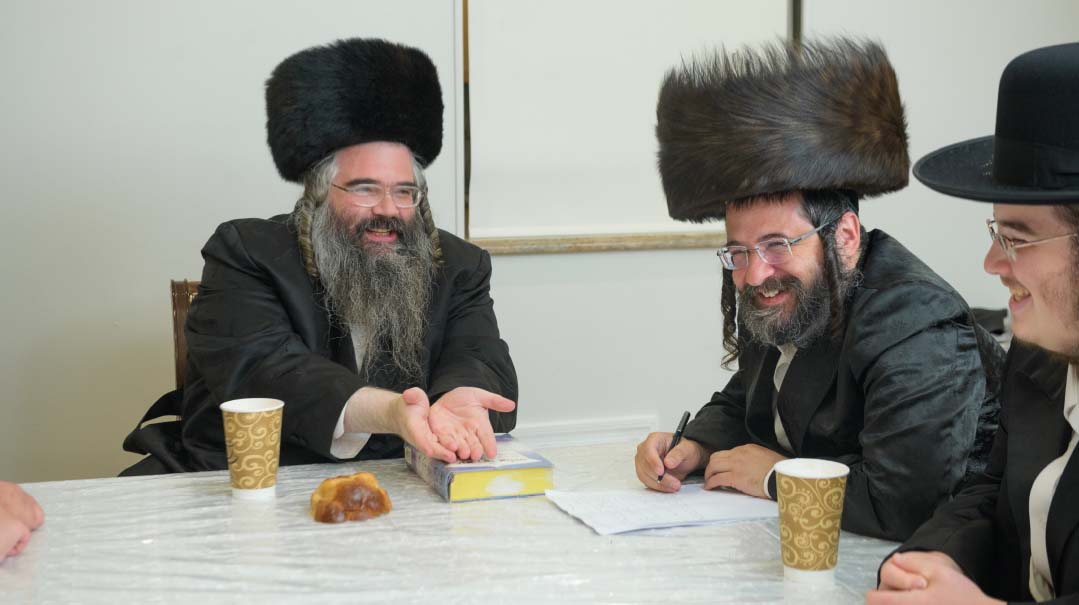
Covid brought new intensity to Reb Avraham Mordechai’s sense of mission. “It was at the beginning of the pandemic. People were dying one after the other. The doctor warned my wife that Covid was dangerous for people who are overweight, and I panicked.
“Then one day, it happened. I came down with a fever and was struggling to breathe. My condition deteriorated, and the doctor said I was going to die. So I decided to make a deal with Hashem. Instead of one weekly shiur, I pledged to give a daily shiur. I told Hashem, ‘I’ll give chizuk to Your children, and I’ll tell them what I would want to hear, and You give me chizuk.’
“I named this lecture ‘Coffee with Reb Avraham Mordechai.’ Coffee is soothing. And in Yiddish, it’s kaveh — like in kavei el Hashem, the message we all needed desperately at the time. I went down to the living room; one child played the song ‘Kavei el Hashem’ on the piano and I recorded a shiur, coughing incessantly throughout.
“After the shiur, I felt very ill, and I couldn’t sleep. I went down to the dining room to walk around a bit. I had a strong urge to daven at my father’s kever in Eretz Yisrael, which of course was impossible. I took a yahrtzeit lecht and lit it in memory of my father, and said tearfully, ‘I wish I could daven at your kever. Let this be considered as if I did.’ Then I wept like a little baby. It was a scary time. People were dying every day. I promised again to give chizuk to Klal Yisrael, and then I collapsed into bed, feeling worse.
“Usually, I upload my shiur to the hotline right after I give it, and the first ones to hear it are Israelis and Europeans, where it’s morning earlier. Sometimes, by the time it’s morning for me, there’s already feedback waiting on the line. And you wouldn’t believe the first recorded message that waited for me the next morning:
“This is Spitzer from Ashdod. I’m standing next to the tziyun of your father on Har Hamenuchos and I’m davening for your recovery.
“The message had come in at the exact time that I had lit the candle. But I didn’t know anyone named Spitzer from Ashdod. So I called him and asked, ‘Who are you? And what are you doing at my father’s kever?’ My father’s kever is not easy to locate — it sometimes took me two hours to locate his kever when I went there.
“He answered, ‘For the past two years I’ve been going to his kever each week, and I tell him a vort in your name there.’
“ ‘So why are you calling me only now?’ I asked.
“So he told me. His father was a widower who lived alone in Yerushalayim. Each Thursday night, he would travel from Ashdod to visit his father and then slept over. Before he went home on Fridays, he always stopped at Har Hamenuchos to visit his mother’s kever.
“Once, he noticed the matzeivah of the next kever over, and that it belonged to a Yid named Malach. He wondered if there was any connection between him and the Malach whose weekly shiur he listened to on the way home each Friday morning. The epitaph on my father’s kever speaks of his mesirus nefesh in Siberia. When once during a shiur I spoke of my father’s self-sacrifice during the war, he realized it was my father’s kever.
“But I still didn’t get it: ‘Why are you only calling me now to tell me about this?’
“ ‘I usually go to Yerushalayim on Thursdays,’ he explained. ‘This time, because of Covid, I knew I wouldn’t be able to visit my father anyway. And it was Erev Rosh Chodesh on Wednesday, so I decided to go to Yerushalayim on Wednesday, just to daven at Har Hamenuchos.
“ ‘While driving, I thought to myself, Too bad Malach’s weekly shiur isn’t on yet. And suddenly I got the alert that the new shiur had been uploaded. I listened to the Kaveh that you gave. I was so moved that I felt I had to tell your father. Of course, I heard the coughing, and realized that I had to daven for a refuah for you as well…’ ”
Reb Avraham Mordechai has found that sprinkling his shiurim with humor and wit gives him a direct route to his listeners’ minds and hearts. Still, while he is unquestionably entertaining, he never loses sight of his ultimate goal. And while he travels extensively, he will not, under any circumstances, join vacation programs. “I don’t like being part of an entertainment roster that includes the juggler, the comedian, and the magician,” he explains.
Joining us for Melaveh Malkah is the Fromowitz family, good friends of the Malachs, and his regular audience at the Thursday night derashah he records at home. I’m surprised and delighted to find out that Reb Yossi Fromowitz is the “lacher,” the voice behind the rolling laughter that is always heard when Reb Avraham Mordechai offers an especially witty thought. For years, there have been theories about the nature of the laughter; now Reb Yossi agrees to go public with his secret.
“When I want to raise the morale in my classroom a bit,” Reb Avraham Mordechai relates, “I call Yossi, put the phone on speaker, and ask him to get a smile out of them. There’s nothing like it to restore some life to a sleepy classroom.”
“Aren’t you afraid that sometimes, your ‘milsa d’bedichusa,’ the humor, is a bit too much?” I ask, hoping I haven’t crossed a line.
Reb Avraham Mordechai doesn’t seem perturbed. “No,” he answers. “I think there is no better way to convey messages of mussar and lessons for life than to make them accessible in this way. It’s the most up to date language, and most effective one that speaks to our youth.”
And he explains. “Our generation is called the ‘ikvesa d’Mishecha.’ We are the heel. Sometimes we come to visit a sick person, and he is covered with bandages. You can’t touch him or pat him. The only thing you can sometimes do is draw close to his exposed heel and tickle it a bit with your fingertips, bringing him a smile. This is our way of arousing this generation, with the heel. With tickles that generate smiles. Needle pricks don’t scare anyone anymore today.”
I wonder aloud if he still needs to prepare a lot before speaking. His answer surprises me.
“A ton. It’s endless. Often, after I’ve already recorded an entire speech, I listen to it and decide that it’s not what I want and I don’t broadcast it.”
“But it always looks like you’re just saying things off the cuff!” I exclaim.
“Nu, you can only imagine how hard I have to prepare and how hard I have to work to make it look that way,” he answers.
Chinuch is a focal point of passion for Reb Avraham Mordechai. Throughout his meteoric rise, he has never stopped giving shiurim in yeshivah. He also has a group of older bochurim to whom he delivers a shiur in mussar and chassidus.
His family remains his priority. Despite the heavy demand for his lectures over weekend chizuk events, one of the rules he’s adopted is that he will not be away from home for two consecutive Shabbosim.
Chinuch is a primary theme in his lectures as well. He teaches parents how to communicate with their children, how to influence them without distancing them. He pleads with parents not to scream, not to threaten, and sometimes, not even to get involved, but to simply calmly consider what can be done.
He decries the phenomena of parents who live in their own world, held captive by their phones or private affairs, and then demanding that their children follow the straight and narrow. Reb Avraham Mordechai also isn’t deterred that young bochurim listen to his speeches.
“When they grow up and become parents, they’ll be able to implement what they heard as bochurim,” he says with a grin.
His listeners are familiar with the motto he uses in almost every speech on chinuch. Reb Avraham Mordechai asks parents to do one simple thing: “Say a good word! Sometimes one good word, even if it’s not entirely accurate, can transform a child completely!”
He shares a story to bring out his point. “I davened Shacharis one day at the Klal Yisrael shul of the Nikolsburger Rebbe. I was standing on the upper level of the huge porch near a bochur when an empty coffee cup someone had left on the railing fell to the lower level. I looked at the bochur, wondering if he would go downstairs to pick up the cup, or ignore it like most bochurim I know from my 20 years in yeshivah would.
“But no, the bochur went down to the lower level and picked up the cup. I went over to him and said, ‘Has anyone ever told you that you’re a good boy with good middos?’
“A few weeks later, the menahel ruchani of one of the yeshivos in the area met me and said, ‘Reb Avrum Modche, you cannot imagine what chizuk you gave to a bochur from my yeshivah.’
“‘You must mean one of my speeches?’ I asked.
“‘No,’ he replied. And he told me the story with this bochur. ‘You should know that this bochur was on the verge of leaving yeshivah,’ he said. ‘He has a weak mind, he didn’t have chavrusas, and he had decided to drop out. Then you came with your compliment and he was reborn. He tells it to anyone who is willing to listen.’”
Reb Avraham Mordechai then shares another powerful story.
“This morning when I came out of the mikveh, I met Reb Simcha Weber. He’s an American Yid who has a fiery chassidic soul. Each Friday night, he walks for about 45 minutes to the Rachmistrikva Rebbe’s tish, and when he’s in Eretz Yisrael he does not miss a single tish at the Rebbe of Toldos Avraham Yitzchak. He had an amazing story to tell me.” He then related Reb Simcha’s words.
“We spent Shabbos with my parents in Long Beach,” Reb Simcha said. “In the middle of the seudah, my two-year-old son got tired and we decided to put him to sleep. We said Shema with him and sent him to bed. Suddenly, I remembered that I hadn’t yet danced with him Shabbos Kodesh like I do with each child individually on Friday night after the seudah.
“I checked on him and saw that he was still up. He said to me, ‘Tatty! We didn’t dance Shabbos Kodesh.’
“ ‘Let’s dance now!’ I replied.
“He happily agreed, but insisted on coming out of bed. With no choice, I took him out, and as we danced in the dark, singing ‘Shabbos Kodesh,’ a heavy bookcase collapsed onto his bed.”
Reb Avraham Mordechai concludes the story. “On Motzaei Shabbos, Reb Simcha called the Toldos Avraham Yitzchak Rebbe, who told him, ‘The merit of Shabbos protected you.’ ”
Besides the incredible Hashgachah manifested in the story, Reb Avraham Mordechai notes the beauty of the father’s custom of dancing with his children, and the vital importance of maintaining a strong connection between parents and children. It can save their lives.
His shiurim reach every Jewish corner in the world, and sometimes one story generates another, as the inspiration multiplies exponentially.
“During one of my speeches, I described how the middah of chesed is ingrained in our Jewish DNA, and I illustrated my point with this story: There was a restaurant in Manhattan. One of the workers, bothered by the amount of food discarded every day, asked the owner’s permission to donate the leftover food to the old age home across the street.
“The seniors were grateful, except one, who refused to touch the food. When the worker inquired why, he said, ‘Because it’s Jew food and I hate Jews!’
“ ‘But I’m not Jewish,’ the man told him.
“ ‘I don’t know,’ the old man insisted, ‘only Jews can do this kind of thing.’
“That night, the worker shared what had had happened with his mother. She was very agitated, and shared with him that he was indeed a kosher Jew.”
The story has an interesting sequel. A woman reached out to Reb Avraham Mordechai, sharing that she’d met a nurse in the hospital who admitted she was Jewish, but was completely uninterested in learning more about Yiddishkeit.
The next time she went to the hospital, the volunteer driving the car was playing Rabbi Malach’s shiur, where he shared the story about the restaurant worker who discovered his Jewish identity. When the story ended, they arrived at the hospital, where the woman met the same nurse again. The nurse was upset, and shared with the woman that she was very bothered by the staff’s attitude toward a sick child who was alone.
The woman, still under the influence of Rabbi Malach’s story, shared it with the nurse and told her, “The reason you’re so upset by the mistreatment of this little boy is because you’re Jewish, and you cannot escape your Judaism!”
The nurse began to cry, and has been growing spiritually ever since.
Reb Avraham Mordechai has learned to take his words very seriously. “People absorb every word, every nuance, every move,” he says. “It’s happened that a sefer that I mentioned during a shiur sent sales spiking sharply till it was sold out.”
It’s not a responsibility he takes lightly. And so he continues to share his messages, in yeshivah, at weddings, at chizuk events, delivering mussar and Torah lessons in packaging that leaves the listeners waiting for more.
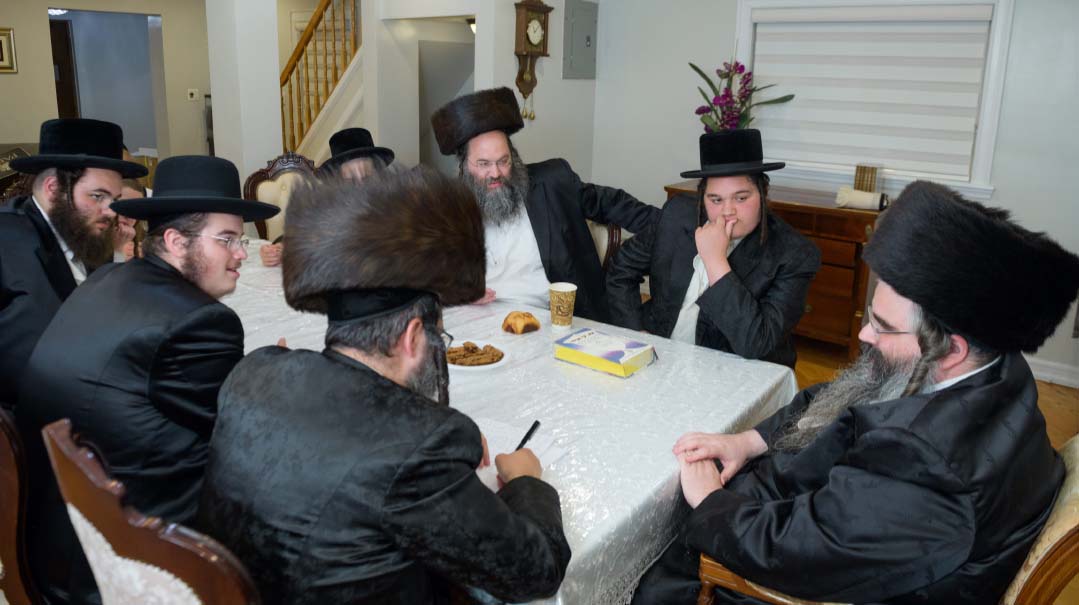
(Originally featured in Mishpacha, Issue 888)
Oops! We could not locate your form.


